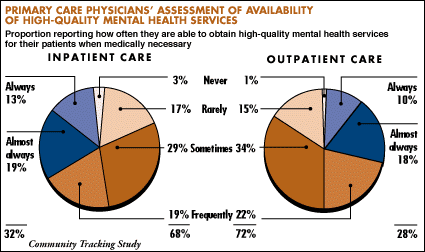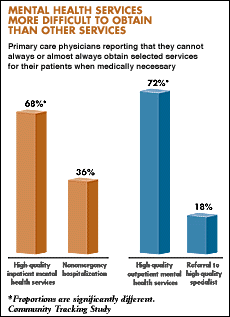
Data Bulletin No. 06
Fall 1997
Miriam Shuchman, Robert F. St. Peter
![]() any Americans lack access to mental health care even when their primary care physicians believe it is medically necessary. According to a survey conducted by the Center for Studying Health System Change, more than two out of three primary care physicians report that they cannot always or almost always obtain needed high-quality mental health care for their patients.
any Americans lack access to mental health care even when their primary care physicians believe it is medically necessary. According to a survey conducted by the Center for Studying Health System Change, more than two out of three primary care physicians report that they cannot always or almost always obtain needed high-quality mental health care for their patients.

![]() hen asked to rate their ability to obtain a broad range of services deemed medically necessary for their patients, physicians report that high-quality mental health care is more difficult to get than other services included in the survey. This finding is particularly striking because it is based on responses from primary care physicians -- such as family practitioners, internists and pediatricians -- rather than from mental health specialists.
hen asked to rate their ability to obtain a broad range of services deemed medically necessary for their patients, physicians report that high-quality mental health care is more difficult to get than other services included in the survey. This finding is particularly striking because it is based on responses from primary care physicians -- such as family practitioners, internists and pediatricians -- rather than from mental health specialists.
Sixty-eight percent of primary care physicians nationwide say they cannot always or almost always obtain high-quality inpatient mental health care for their patients, compared with 36 percent of primary care physicians reporting the same level of difficulty obtaining nonemergency medical hospitalizations. (See bar graph below.)
 Access to high-quality inpatient mental health care is especially difficult in some metropolitan areas. (See table below.) For example, 81 percent of primary care physicians in Phoenix and 77 percent in Syracuse indicate that they cannot always or almost always obtain high-quality inpatient mental health care for their patients who need it. In addition, primary care physicians practicing in non-metropolitan areas are more likely (76 percent) than those in metropolitan areas (67 percent) to report such difficulty.
Access to high-quality inpatient mental health care is especially difficult in some metropolitan areas. (See table below.) For example, 81 percent of primary care physicians in Phoenix and 77 percent in Syracuse indicate that they cannot always or almost always obtain high-quality inpatient mental health care for their patients who need it. In addition, primary care physicians practicing in non-metropolitan areas are more likely (76 percent) than those in metropolitan areas (67 percent) to report such difficulty.
The survey also found that 72 percent of primary care physicians nationwide say that they cannot always or almost always obtain high-quality outpatient mental health services. This is four times the percent who report that they cannot always or almost always obtain referrals to high-quality medical specialists. Primary care physicians in Seattle (81 percent), Lansing (80 percent) and Syracuse (80 percent) are more likely to report difficulty obtaining high-quality outpatient mental health services.
Even in Miami, where primary care physicians are less likely to report difficulty, more than half report that they cannot always or almost always obtain high-quality inpatient (58 percent) and outpatient (61 percent) mental health services.
![]() hy should needed high-quality mental health services be so much harder for primary care physicians to obtain for patients than other medical services? The factors at work may include an overall shortage of mental health facilities and specialists, or an uneven distribution of these services. This may explain the higher proportion of difficulties reported by primary care physicians caring for patients in non-metropolitan areas. The widespread initiation of managed care behavioral health programs also could affect the availability of mental health care. Another explanation may be that health insurance policies typically do not cover mental illness to the same extent as physical illness.
hy should needed high-quality mental health services be so much harder for primary care physicians to obtain for patients than other medical services? The factors at work may include an overall shortage of mental health facilities and specialists, or an uneven distribution of these services. This may explain the higher proportion of difficulties reported by primary care physicians caring for patients in non-metropolitan areas. The widespread initiation of managed care behavioral health programs also could affect the availability of mental health care. Another explanation may be that health insurance policies typically do not cover mental illness to the same extent as physical illness.
There is an active debate between those calling for parity -- equivalent insurance coverage for physical and mental health care -- and those arguing that current limitations on mental health coverage are necessary to prevent runaway costs. Laws addressing parity have been enacted recently by Congress and several state legislatures, but they are limited in scope and unlikely to resolve the debate. The Center will continue to track changes in physicians’ ability to obtain mental health care and other medical services for their patients.
| Primary care physicians reporting that they cannot always or almost always obtain inpatient mental health care for their patients when medically necessary | Primary care physicians reporting that they cannot always or almost always obtain outpatient mental health care for their patients when medically necessary | |
| Boston, Mass. | ||
| Cleveland, Ohio | ||
| Greenville, S.C. | ||
| Indianapolis, Ind. | ||
| Lansing, Mich. | ||
| Little Rock, Ark. | ||
| Miami, Fla. | ||
| Newark, N.J. | ||
| Orange County, Calif. | ||
| Phoenix, Ariz. | ||
| Seattle, Wash. | ||
| Syracuse, N.Y. | ||
| Metropolitan areas over 200,000 pop. | ||
| United States | ||
| *Site value is significantly different from mean for metropolitan areas over 200,000 population.
Community Tracking Study |
||
This Data Bulletin presents preliminary findings from the Physician Survey conducted in 1996 and 1997 as part of the Community Tracking Study. It is a nationally representative telephone survey of non-federal, patient care physicians (excluding certain specialties -- e.g., radiology, anesthesiology, pathology). The survey included 9,264 physicians, of whom 5,160 are primary care physicians. All comparisons and differences described in the text are statistically significant at the p<0.05 level.